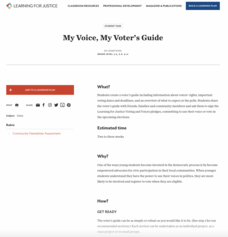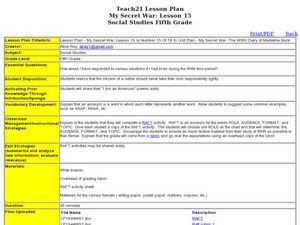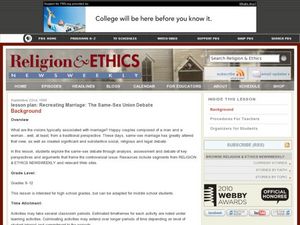Teaching Tolerance
My Voice, My Voter's Guide
Class members may be too young to vote, but that doesn't mean their voices are silent! After researching key information, such as policies for registering to what to expect at the polls, young scholars create and present election guides...
Curated OER
My Secret War: Lesson 15
Fifth graders discuss civic responsibility. In this social studies lesson, student read about World War II. Students compose "I Am an American" poems and share with the class.
Curated OER
Using Multimedia to Teach Core Democratic Values
Students produce multimedia presentation to fellow class members on one of the Core Democratic Values, such as patriotism or civilian control of military, that is part of State of Michigan Social Studies Framework.
Curated OER
Designing a Flag
Fourth graders design a flag. In this social studies lesson, 4th graders discuss the basic principles of flags. Students research flags and flag designs. Students work in teams to design a flag using the computer.
Curated OER
Disasters
In this social studies activity, students find the words that are used to describe different types of disasters. The answers are found at the bottom of the page.
Curated OER
Native American Tribes
In this social studies worksheet, students find the words that are used to focus upon the Native American tribes and the answers are found at the bottom of the page.
Curated OER
Understanding Bias
High schoolers participate in an interactive writing and discussion activity, on the study of bias, as it is used in political debate and decision making. They evaluate the presentation of material and its importance in making informed...
Curated OER
Social Studies: Campaign Finance Reform
Students develop arguments for and against campaign finance reform, examine federal and state laws that attempt to limit contributions to political candidates, evaluate various plans for campaign finance reform and formulate their own...
Curated OER
The Three Branches of Government (Legislative, Executive, Judicial)
Fifth graders compare the three branches of government to a three-legged chair. For this government lesson, 5th graders discuss the Founding Fathers, the Constitution, and checks and balances. Students study what each branch of...
Curated OER
CIVICS AND HISTORY LESSON
Students conduct research using recommended websites and other appropriate resources. Based on their findings, groups prepare recommendations for future elections to ensure efficiency and fairness. students must refer to the 2000 election.
Curated OER
CIVICS/CURRENT EVENTS
Students choose to either make an exhibit of posters of pictures about Darfur, or write a letter to the local newspaper regarding Darfur, or plan a concert, party, or bake sale to raise money for refugees. They write a poem defining...
Curated OER
Willing to Participate: Political Engagement of Young Adults
Students consider what it means to be politically involved. In this civics lesson, students discuss voting as a privilege or right. Students also discuss how they may be able to effect social change through political involvement.
Curated OER
Recreating Marriage: The Same-Sex Union Debate
A debate continues regarding same-sex marriage as a constitutional right. This lesson requires learners to define marriage then formulate an argument that reconstructs the national debate perspectives. Many standards are addressed but a...
Curated OER
Matching Events and People
In this social studies events worksheet, students match important events in history with people that were involved at the time. Students complete 13 matches.
Curated OER
Picture This: Election Results Graphs
Students use art supplies or a free online tool to graph election results. Students follow local election and results. Using "Create a Graph, a free online graphing tool, they make a graph of the results.
Curated OER
Civil Liberties and War Powers: Korematsu v. United States
Eleventh graders compare and contrast Supreme Court decisions dealing with the application of civil rights during times of war, with emphasis on discrimination and detention. Working in groups, 11th graders review cases and analyze how...
Curated OER
Stories of Freedom and Justice: Learning Resources
Students are introduce to the topic of nonviolence and civil rights by watching a video. In this stories of freedom lesson, students examine the Supreme Court's role in interpreting the U.S. Constitution. Students analyze how conflict...
State Bar of Texas
Baker v. Carr
Can the federal government override the state government to protect the citizens of the United States? The 1962 Supreme Court case Baker v. Carr outlines the issue of equal protection under the law. Scholars investigate with a short...
Curated OER
Mapping Your State's Role in the Vietnam War
Students recognize reasons to celebrate Memorial Day. Students create a map of victims of the VIetnam War. Using the internet, students research information about soldiers from their state who were killd in action in Vietnam. Students...
State Bar of Texas
Plessy v. Ferguson
Where did separate but equal originate and what does it mean? Scholars investigate the Supreme Court Case Plessy v. Ferguson. Using a short video clip, they analyze the impact the decision of legal segregation had on society in 1896....
State Bar of Texas
Schenck v. US
Freedom of speech is absolute—or is it? The Supreme Court case Schenck v. United States has learners research what free speech really looks like. A short video along with paired work creates open discussion and thought on what speech is...
State Bar of Texas
Hernandez v. Texas
What if the jury is not made up of people from your ethnicity or background—are they still considered your peers? Scholars analyze the impact the Supreme Court case Hernandez v. Texas had on jury selection across the nation. Paired...
State Bar of Texas
Engel v. Vitale
Can you bow your head and pray in school? Scholars investigate the issue of school prayer with the Supreme Court case Engel v. Vitale. A short video clip along with paired group work helps viewers form opinions on the matter. They answer...
State Bar of Texas
Miranda v. Arizona
You have the right to remain silent—but why? Scholars analyze the nature of what has become known as the Miranda Rights. A short video along with paired group work and discussion opens the issue of the rights of the accused upon arrest....

























